Do you trust your gut? Has it helped you when you need it, or do you feel like it's led you astray? Or maybe it's not even something you have or feel like is part of your process.
Regardless of how you feel about your gut, it's an interesting topic, and one we haven't really covered before in this newsletter, nor on the Lighthouse blog.
That's why I'm excited to finally cover it in this week's edition along with a detailed breakdown of new workplace report, a last chance opportunity, and a new post on striking the right balance at work.
Let’s dive in…
Table of contents:
- 🥘 Food for Thought on Trusting Your Gut?
- 📰 News & Reports for Managers on the Work Institute's 2024 Retention Report
- 🔜 Don't miss out on Learning how to Manage Up like a Pro
➡️ Did a friend forward this to you? Get every issue straight to your inbox by signing up here.
Note: This is a preview of our weekly leadership newsletter, Lighthouse Leadership Weekly (LLW).
To get this sent to your inbox every week, along with our latest long form essays on this blog, you can sign up here.
🥘 Food for Thought
"Every time I didn't trust a "weird feeling" I had about a candidate (positive or negative), I made a hiring mistake.
The gut knows what the conscious mind cannot express." - Kevin Espiritu, Founder & CEO at Epic Gardening
I saw this come across Twitter as part of a collection of lessons Kevin has learned over the years.
And this gives us an important opportunity to talk about something we haven't talked about much at Lighthouse: Your Gut.
A painful lesson in trusting your gut
I've trusted my gut for a long time. I still remember touring Northeastern University's campus while in high school and knowing quickly, "This is where you're going to school, and it's going to be awesome." And it was.
And every time I'm searching for a new place to live, gut feel is a huge part of choosing the right place to call home.
It took a little longer to develop my gut feel in leadership, but one moment really solidified it.
Early in my career, I told a former boss about someone we were considering hiring,
“I can’t explain it, but I have a bad feeling about them. I wouldn’t hire them if it was my company.”
Because I couldn't give a good reason other than a vague gut feel, they hired them anyways. I can't blame them given my age, position, and lack of logical explanation.
Unfortunately, a few months later my gut feel was confirmed.
This very experienced engineer “accidentally” deleted a large portion of our production database in the middle of the night. Once they did it, they went to sleep, telling no one there was an issue.
Mid-morning, when the whole company was in a panic over the issue and the whole engineering team was working to fix it, they took zero responsibility, blaming anyone and everyone else. They then would go onto email the entire company about it saying it wasn't their fault and again blaming others for what happened.
Writing this out, it's almost too spot on, isn't it? Yet, I can assure you this is a true story, which made me trust my gut in hiring ever since.
Do you trust your gut?
One of the most powerful tools you can develop as a leader is your gut. As Kevin described, it often can detect things before you have hard facts and data.
Yet, it doesn't come easily, and it's not always obvious.
Which is why we're not stopping with that being the lesson, That wouldn't be helpful, would it?
Let's instead talk about the really important question: How do you develop your gut?
Simple ways to develop your gut instinct as a leader
While your gut is kind of this vague instinct that's hard to describe, there are some things you can do to hone it, so you can learn to hear it, trust it, and integrate it into your decision making process:
- Practice listening to your inner voice: The first thing you need to do is to make sure you're actually listening to your gut. If you haven't been doing that, it can feel very faint and distant. The next time you think you're getting a gut feel on something, pause and reflect. Ask what you think it's trying to tell you and acknowledge its attempt to help you. This will make your gut more likely to speak up in the future, too.
- Try it on small things: Before you have your gut push you to make big, bold bets, consider listening to it on low stakes things. One of my first work-related gut feels was when, right after graduation, broke and unemployed, I got a gut feel I should attend a conference in town. This ended up changing my life, helping me get a job and launch a business, but if it hadn't worked out, I'd only have been out $300.
- Make note of it and then watch the outcome: Recall my story above about the risky hire. I was not in a position to act on my gut, but I was able to make a mental note. Three months later I clearly got my answer. That helped me be more confident next time I got a similar feel, and encouraged me to make similar notes. Over time, I grew more and more confident, and started to understand what I should do to investigate the gut feel to confirm it with more conventional evidence.
In a world of imperfect information and a demand to make many decisions quickly, your gut is a valuable resource worth the effort to develop.
While developing your gut instinct isn't easy, it is one of many things you use to make the best decisions possible as a leader.
📰 News & Reports for Managers
📌 What we found in the 2024 Retention Report: A lot of nuance in how to retain your people
We're always on the lookout for interesting reports that can help us understand the challenges leaders and managers are facing. One of the biggest is obviously retaining your team.
With that in mind, we were excited to see the Work Institute just released their 2024 Retention Report.
Here's how they described their key findings:
"Work Institute’s research reveals there are new preferences and expectations emerging quickly that impact the decisions employees make and their perceptions of their employers.
Those new expectations for most include more focus on work-life balance, alternative work arrangement, specific type of work they are doing, organizational culture, health and family concerns, and the behaviors and capabilities of their managers and their teams or the people they work with the most."
Let's explore more specifically what all that means. Here's 6 of our favorite takeaways:
1) The trend of employees leaving continues to grow
This is quite the stunning chart. It shows that the rate of people quitting has *doubled* since 2009:
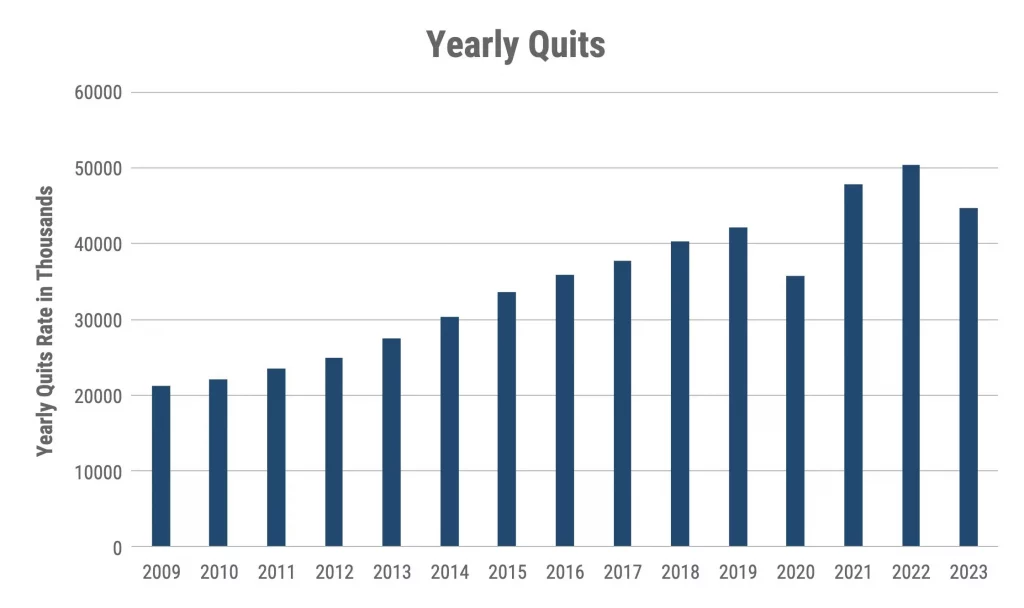
While there's been some more variability in recent years, you can see the general trend line up has continued, and based on the rest of the report, I don't think there's a lot of reason for optimism that 2023 being down slightly is a particularly strong trend or correction.
Remember: Turnover is expensive! The cost of replacing an employee is often a sizeable portion of their annual salary. The Work Institute estimates it to be approximately 33% of an employee's salary, and we've calculated to be as high as 65% if you are searching for a difficult to fill role.
This trend is exactly why we're summarizing their findings; it's important to know why this trend is happening, and what you can do to avoid being another statistic
2) The many reasons people quit:
Now that we know people are quitting, it's important to understand why they quit. Fortunately, the rest of the report is trying to answer that question.
Here's how the different reasons break down:
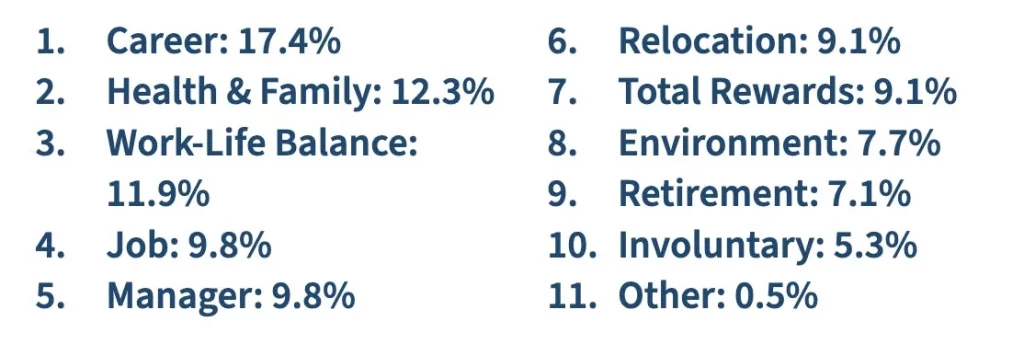
And so we're all on the same page, here's what those categories specifically mean:
- Career: Opportunities for growth, promotion, achievement, security, or to attend school
- Health & Family: Child or elder care, work-related health, or non-work-related health
- Work-Life Balance: Travel, commute, scheduling preferences, or work arrangements
- Job: Stress, availability of resources, training, job characteristics, empowerment, or products
- Manager: Professional behavior, support, knowledge and skills, or communication
- Relocation: Employee initiated, company initiated, or spouse initiated
- Total Rewards: Base pay, benefits, bonuses, or commissions
- Environment: Organizational culture, facilities or physical environment, mission and values, safety, diversity, or coworkers
- Retirement: Personal decision to exit the workforce
- Involuntary: Termination or layoff
Now, those numbers are interesting as you can see that over 60% of the reasons people quit are covered by the top 5 reasons, and those are largely in your control as a manager.
But you may be wondering: Are any of these outliers just in 2023, or are they lasting trends to pay attention to?
Fortunately, since Work Institute has been doing this report for over a decade, they can share that answer, too:
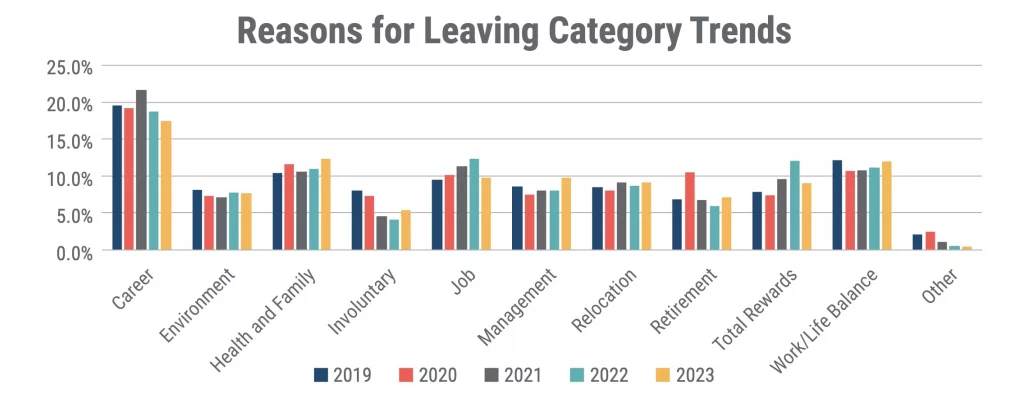
Interestingly, the main changes this year were increases in:
- Health and family
- Management
- Work/Life Balance
- Involuntary
You can see that after a decline during the pandemic, there's been a steady rise in people prioritizing their health and family, and having a better work/life balance. Those certainly make sense against the patterns we've seen, and is probably one of the biggest positives to come out of all of this.
It also then makes sense that you would also decide life is too short to work for a jerk or a company you hate, thus leading to the rise in the "management" category.
On the flip side, we see there were decreases in:
- Career
- Job
- Total Rewards
Now, the decreases don't really surprise me. The economy is getting weaker, so not surprised there would be fewer people leaving jobs they don't like or want better compensation (because they're glad to have any job and it's a hard market to find another job).
And we'll be exploring Career in detail later, so stay tuned on that...
3) Age changes your reasons for leaving
Another interesting way to segment this data is to look at people's reasons for quitting by age, which is nicely segmented in this chart:
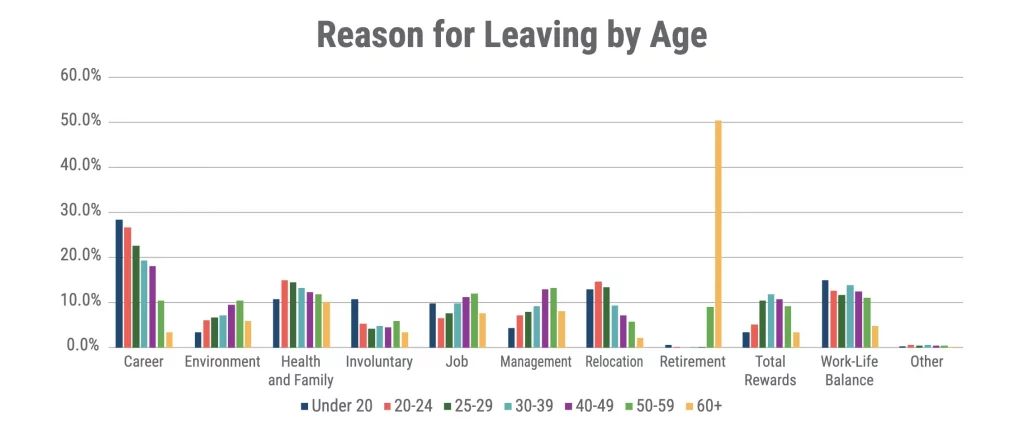
As you can see, the younger you are, the more you leave for:
- Career advancement
- Getting fired (involuntary)
- Relocation
- Work-life balance
If you think back to early in your career, these reasons make a lot of sense. You can advance quickly early in your career, and if you feel stagnant, it can be very tempting to move on quickly. Meanwhile, if you're not well accustomed to the work place, it's easy to get fired, as well as laid off because you're a junior employee or one of the most recent hires.
Meanwhile, the older you get, the more you leave for:
- Issues with management
- Disliking the job
- Total Rewards
- The work environment
If you think about your own career, these should also make sense. The more settled you get in your career, the more you prioritize who you work with and enjoying your work. Yet, mortgages still have to get paid, and the urge to keep up with the Joneses can be strong, also leading to a high priority on compensation.
And as a manager, you should zoom out and look at these reasons and match them to your own team. This is how you tactically manage well across generations; instead of treating everyone the same, you use data like this to understand where different people on your team want and need different things.
By being fair but different with each person on your team, you have the best chance to retain everyone you want to.
4) How long you've been at a company changes reasons for leaving, too
Now, this is an analysis I wasn't even thinking about when they opened the report, but I'm glad they did it. It reminds me of this important lesson we've talked about before:
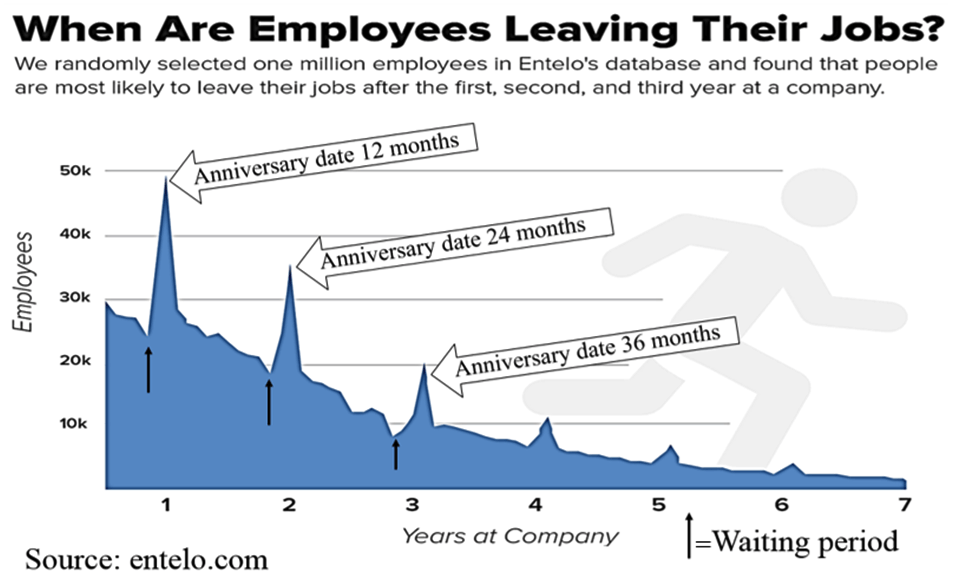
Entelo's data showed us that there's a spike at work anniversaries, and that overall people are less likely to leave the longer they're at a job, but it didn't tell us why people left at those different times.
Now, we have a clearer answer:
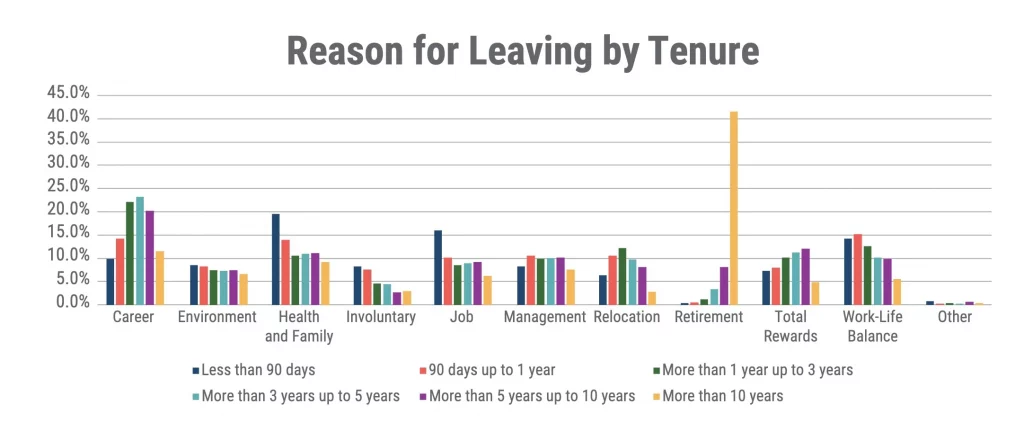
Here's what I notice from this chart:
- After about a year, you're at risk of people leaving if they don't feel like they're growing in their career. We preach this all the time so interesting to see it's held steady.
- If people are unhappy with the work-life balance at your job, they're likely to leave within the first few years
- Bad management and a poor work environment will consistently make people leave no matter how long they've been at a job.
- Compensation (Total Rewards) plays a larger role the longer someone is at your company, which I think likely plays into the common story I've seen that is best summed up as, "If I'm lucky, I can get a 5% raise per year if I stay here, or I can go there and get a 30% raise right away..." The longer someone stays, the wider that gap becomes, especially if you're the kind of company that makes people, "do the job before we give you the title and salary."
Once again, if you're the kind of manager that likes to think ahead, use this chart to think about the kinds of topics and questions you should be exploring with team members. Many of these can be solved before they cause someone to leave, if you talk about them and work out solutions with them.
5) Career has been the top reason every year since 2010. What does it really mean?
One of the key insights they really harp on throughout the report is that career has been the top reason every year they've done the report, so I love that they broke down the sub-reasons that make up "Career" so we can better understand recent trends:
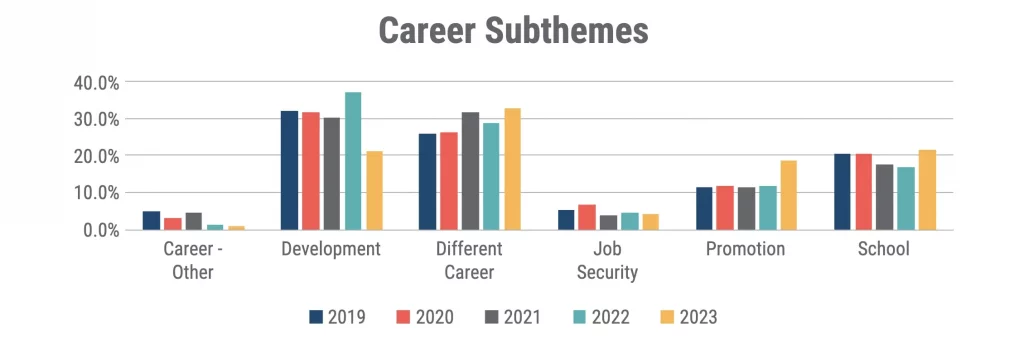
Development has fallen as the top reason, presumably because more companies have been investing in it (this is what the report states). What's interesting is what we can see spiked this year:
- Different career: Over 30% quit to do something else, deciding their current job wasn't satisfying to them.
- Getting promoted: If you're not getting the promotion you want, often another company will give it to you to close a recruit they really want. This can also happen if you're the kind of company that makes people do the job without the title first. Guess what? People will put that on their resume and get another company to promote and pay them for it if you don't.
- Back to school: Appears to be a more popular choice again, which I was not expecting.
As a manager, the main ones for you to look at for then are:
- Getting Promoted: Keep in mind at review time that if someone deserves to be promoted and you or your boss are putting it off, consider the risk of losing them entirely before you assume you can put it off again or "really make them earn it."
- Back to School: If your company offers tuition reimbursement, you may be able to convince your people to stay while they return to school at night. This then has the added benefit that often those agreements include retention clauses after, so they're not committing to stay at your company for years. Given the cost of tuition and the value of what they learn, that can be a real win-win.
Obviously, there's not much you can do about someone changing careers, but in that case I think that's good turnover; if they don't love the work, I'm not sure they'd do a great job for you anyways. They also could be a toxic influence on your team, creating team environment problems that could cause others to quit (remember it's about 7-8% of the reason people leave).
6) Being a respectful, caring manager matters more than ever
Management moved into the top 5 this year, with its highest total in the last 5 years. That shows your role is more important than ever.
Fortunately, the report broke down what contributes to these scores as well, so let's close by taking a look at them:
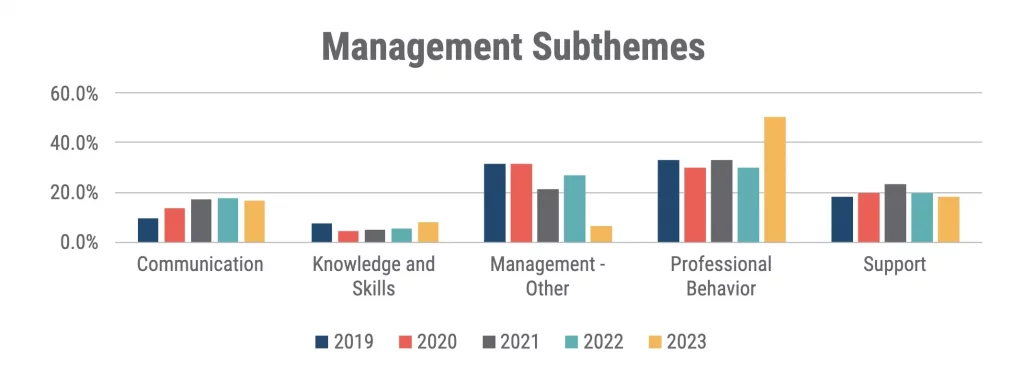
As you can see, the top reason within the larger cause of leaving over management was "Professional Behavior." People's tolerance for rude, abrasive, difficult managers has seemed to decrease greatly as you can see the spike this year.
At the same time, you can see it's also important to invest in communicating well and providing support to your team. Both have been consistently valued across the last 5 years, and are squarely areas of responsibility for you as a manager to provide them for your team.
----
Overall, this report provides an interesting and helpful perspective on what causes employees to leave. Ultimately, that's the biggest sign of whether you're a good manager or not, so it's worth taking to reflect on how you can apply these insights to how you lead your team, and what you ask them about to ensure you retain them.
There's a lot more to learn from the report, so if this data interests you, go check out the full report here.
🔜 Your Last Chance to Master Managing Up
TLDR: Our Mastering Managing Up program starts next week. Get more of what you want and your team needs by building a great relationship with your boss. Sign up now here.
---
If your company hit a rough patch and your boss came to you to asking you to cut your team, would they listen if you pounded the table to save a key team member?
Or if you really wanted to promote someone, or give them a well deserved bonus, would they care?
If you don't feel like your relationship with your manager is great, then you need to work on it.
Just like you'd invest in improving how you work with a frosty team member, or a challenging peer, you need to invest in making your relationship great with your manager.
You get out what you put in.
Yes, they're your manager, but you have more control over the quality of the relationship than you may realize, which is why we created our program, Mastering Managing Up.
It's 10 action-packed, yet bite-size, lessons that help you do your part to make your relationship with your manager a great one.
Whether you need to turn around a struggling relationship with your boss, are just starting out in a new role, or simply want to go from pretty okay to great, this program can help you.
Here's exactly what you'll learn:
- Lesson 1: The most important step to a great relationship with your manager
- Lesson 2: How to tell your manager you want to improve your relationship no matter its current state.
- Lesson 3: How to make your 1 on 1s with your manager the best hour of their week (and yours)
- Lesson 4: Strengthening your relationship with your manager through feedback & praise
- Lesson 5: How to use Task Relevant Maturity to work better with your manager
- Lesson 6: How to make your team better at managing up to you
- Lesson 7: The keys to delivering bad news that avoids the messenger being shot
- Lesson 8: How to get more of what YOU want
- Lesson 9: Getting in the driver’s seat for your career with the person who decides it most
- Lesson 10: Troubleshooting tactics for the most difficult bosses
While many of you signed up this week, a few people reached out asking for a bit more time to get their budget approved, reimbursement lined up, or otherwise get ready to purchase.
Which is why we're going to leave orders open until the end of the day on Monday.
The program the starts Tuesday, and we put it back in retirement. Then, only a group order of 10 or more managers can take it through our Group Lessons program.
So what are you waiting for? Reserve your spot now to join us here.
(And if you have any questions, or are on the fence, reply ASAP so I can answer them before we close orders Monday)
If a friend sent this to you, sign up here to get this newsletter every Saturday morning: https://getlighthouse.ck.page/9aa103e62f
Sign up to get this newsletter & our latest blog posts straight to your inbox:




